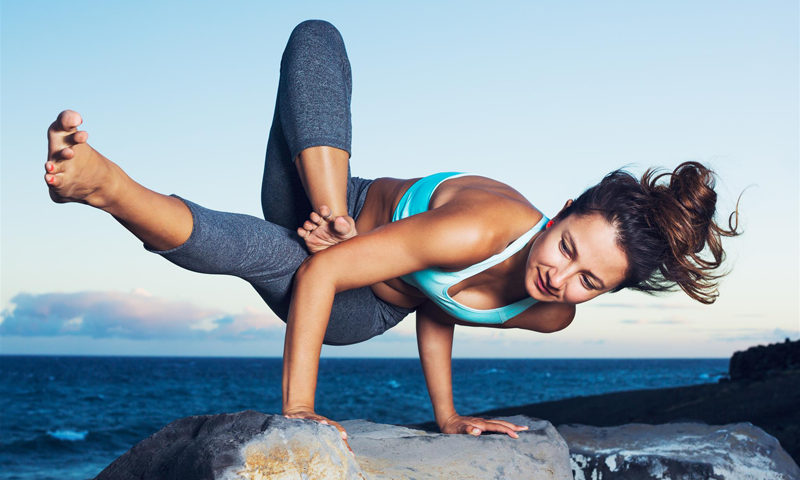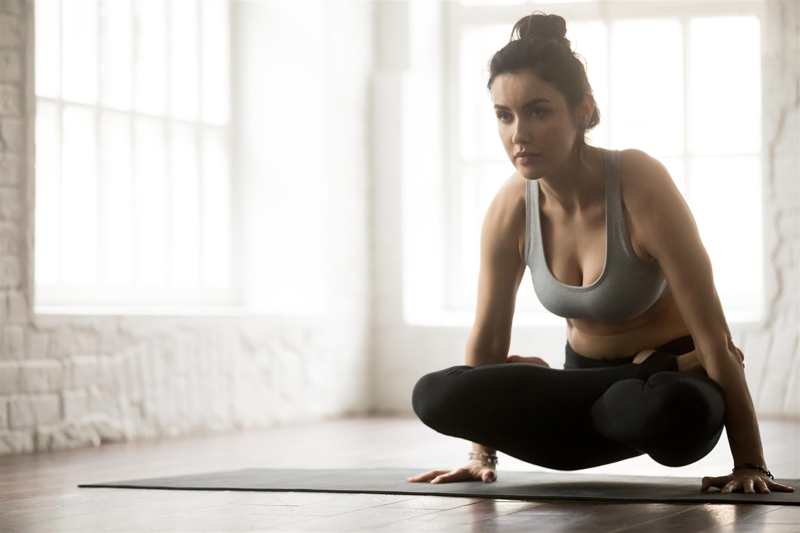
What is Yoga Sutra?
June 23, 2018
Yoga for a Younger Face
July 5, 2018How Yoga Makes You Stronger

Many people associate yoga with increased flexibility and better physical health. While the exercise does provide these things, it can also be used to tone and strengthen the muscles. Today, many athletes are incorporating yoga into their workout to improve their performance and make them less prone to injury. In this article, we explore how yoga makes you stronger. Before getting started, it’s important to pick up a breathable yoga top and some comfy bottoms to wear whilst you practice.
Bodyweight Training
When using certain postures, yoga can be used as a form of bodyweight training. Bodyweight training doesn’t require weightlifting equipment; instead, the individual’s bodyweight provides resistance against gravity. While weight-training at the gym is great for strengthening a certain area, many people end up neglecting other areas of the body. Bodyweight training is a great way to evenly tone and strengthen the body without ‘bulking up’ a certain muscle group.
Holding yoga postures for a sustained period of time increases muscular endurance. This will allow you to work the muscles harder without injury. Additionally, bodyweight training builds strength in the core stabilizer muscles; these are typically regarded as the abdominal muscles, obliques, lower back, and pelvis. Building strength in these areas will allow you to practice more complex asanas without a problem.
Stretches Tight Muscles
If you’re experiencing tight muscles, your ability to exercise may be compromised – especially if you’re hoping to weight train. Yoga gives you the opportunity to stretch out tight muscles before using them for exercise. Not only can this give you a full range of movement when working out, but it also prevents injury from occurring. The supple muscles can then get the most from strength training yoga postures, allowing you to build a strong physical body.
Strengthens the Joints
To enjoy strong joints, the muscles and ligaments surrounding the joints need to be strong, too. Though weight lifting can strengthen these areas, it can easily result in injury if the right precautions aren’t taken. With yoga, however, the muscles and ligaments can be strengthened without worrying. When practicing yoga, synovial fluid circulates to the joints to allow the bones to glide over one another without friction. Synovial fluid also contains a supply of oxygen and nutrient which is delivered to the cartilage. Unlike other areas of the body, cartilage does not have its own supply of blood. This makes synovial fluid that much more important. When using yoga to strengthen the joints, the muscles and ligaments become strong, healthy, and great at absorbing impact.

Increases Breath Efficiency
When working out at the gym, it’s easy to forget about your breathing pattern. During yoga, on the other hand, you are taught about the importance of deep breathing and learn how to use your full lung capacity. Correct breathing can drastically improve strengthening exercises by helping you to hold the posture for a prolonged duration. If an asana begins to feel uncomfortable, slowing down your breathing can help you to stay in the pose and create a deeper stretch. In turn, this process an contribute to stronger muscles.
Poses to Make You Stronger
Boat Pose
Engaging your abdominal muscles and hips, Boat Pose is great for those looking to increase their strength. To practice the asana, sit down on the floor with your legs stretched out in front of you. Place your hands on the mat just behind your hips with your fingers pointing towards your feet. Press your palms firmly into the ground and straighten your arms. Keeping your back straight, lean your torso back and lift your feet off the ground. Your shins should now be parallel to the floor. Finally, extend both arms forward until they are in line with your shoulders. You are in Boat Pose. Hold the pose for 30 seconds whilst breathing deeply.
Plank Pose
Popular amongst athletes of all sorts, Plank Pose strengthens the core, legs, arms, wrists, and shoulders. To practice this asana, stand tall upon your mat. Next, hinge at the waist and lower your upper body toward the ground until your hands and resting on the mat. Your body should now form a triangle. Next, gradually walk your hands forward and shift your weight onto the balls of your feet. Lower your hips until they are aligned with your head and shoulders. Your shoulders should now lie directly above your wrists. You are in Plank Pose. Hold the posture for as long as it feels comfortable to do so. Remember, slowing down your breathing will allow you to hold the pose for an extended period of time.
Chair Pose
Chair Pose strengthens the abdominal muscles, glutes, and quadriceps. Additionally, this posture is great for shifting stubborn abdominal fat. To practice the asana, stand tall on your mat with your big toes touching. Breathe in and raise your arms above your head, pointing your fingers toward the ceiling. Lengthen your neck and draw both of your shoulders back. As you breathe out, bend your knees and lower your bottom down and back as if you are sitting on a chair. With each breath, deepen the stretch by lowering your bottom further toward the mat. You are in Chair Pose. Hold the posture for 30 seconds whilst keeping the abdominal muscles engaged.
In Summary
Whether you’re hoping to strengthen your legs for sporting purposes or you’re more interested in toning your stomach, yoga is a great way to strengthen the body. When using yoga to become stronger, it’s important to wear flexible yoga pants to ensure your movement isn’t limited. Additionally, topping up on water before your session will ensure the muscles remain hydrated and supple.

